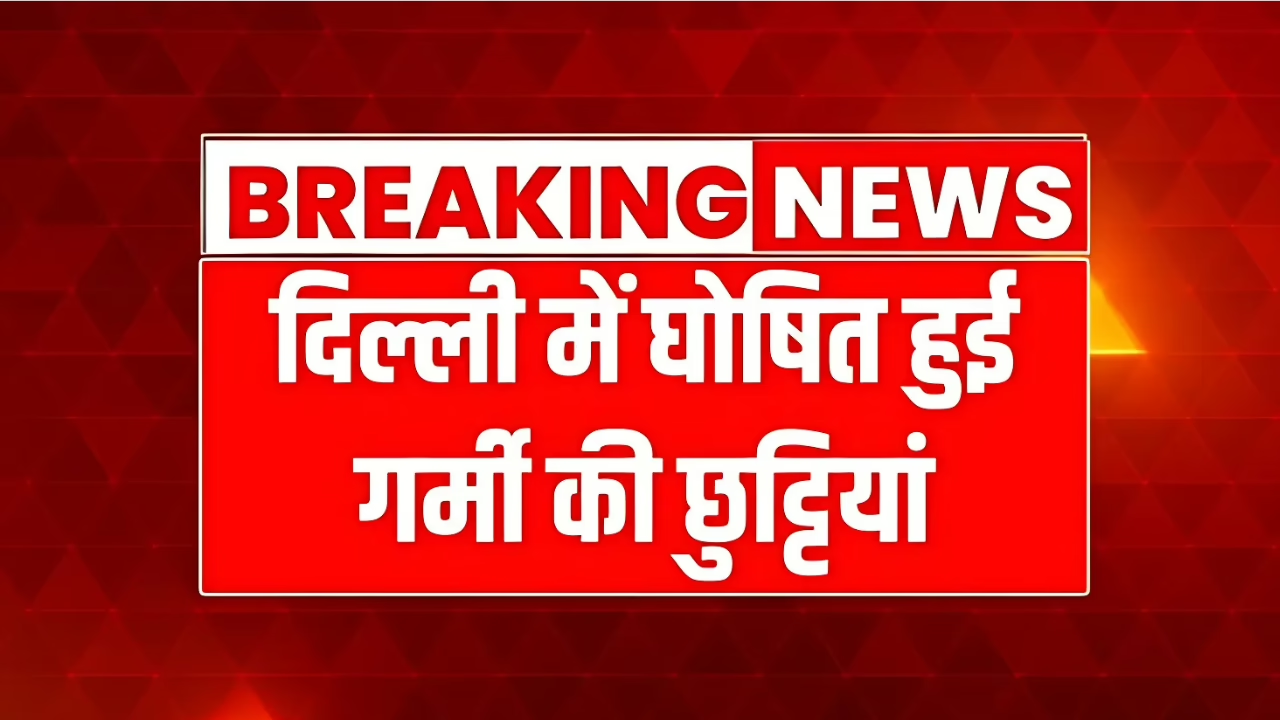Delhi Announces Extended Summer Vacation for Schools: In response to Delhi’s unprecedented early summer heat wave, the Directorate of Education has announced an extended summer vacation schedule for all government, government-aided, and private schools across the National Capital Territory. The decision comes as temperatures have consistently crossed the 45°C mark, creating challenging conditions for students and raising serious health concerns among parents, educators, and health officials.
Summer Vacation Schedule and Implementation
The official notification, issued yesterday by the Directorate of Education, declares that summer vacations will commence on May 11th, nearly two weeks earlier than the originally planned date of May 25th. Schools will remain closed until July 9th, with classes resuming on July 10th, providing a 60-day break that is significantly longer than the usual 45-day summer hiatus.
“The decision has been taken keeping in mind the extreme heat conditions prevailing in Delhi and the forecast of continued high temperatures throughout May and June,” stated Himanshu Gupta, Director of Education, Delhi Government. “The safety and well-being of our students is our paramount concern, and this extended break will help mitigate health risks associated with the severe heat.”
The directive applies uniformly across all educational institutions in Delhi, including government, government-aided, unaided recognized private schools, and schools run by local bodies like the Municipal Corporation of Delhi (MCD). However, schools that had already commenced their summer vacations before this announcement will follow their original reopening dates, provided they ensure a minimum 50-day vacation period.
Meteorological Context and Health Concerns
The decision follows consultation with the India Meteorological Department (IMD), which has predicted that Delhi will experience one of its hottest summers on record. The capital has already recorded eight consecutive days with maximum temperatures exceeding 44°C, with some areas like Mungeshpur and Najafgarh touching 47.8°C.
“We’re observing a significant heat anomaly over Northwest India, including Delhi, with temperatures running 5-7°C above normal for this time of year,” explained Dr. Madhavan Rajeevan, Secretary at the Ministry of Earth Sciences. “Current models suggest limited relief before mid-June, with the potential for multiple severe heat wave episodes.”
Medical experts have strongly endorsed the government’s decision, highlighting the increased health risks for children during extreme heat conditions. Dr. Randeep Guleria, former Director of AIIMS Delhi, noted that children are particularly vulnerable to heat-related illnesses due to their higher surface area to body mass ratio and less developed thermoregulatory systems.
“Children are at higher risk for heat exhaustion, heat cramps, and potentially life-threatening heat stroke,” Dr. Guleria emphasized. “Additionally, the combination of high temperatures and air pollution can exacerbate respiratory conditions like asthma, which affects a significant percentage of Delhi’s school-age population.”
The Delhi Government’s Health Department has reported a 30% increase in emergency room visits for heat-related illnesses over the past two weeks, with approximately 22% of these cases involving children under 15 years of age.
Impact on Academic Calendars and Educational Continuity
The extended vacation period has prompted the Directorate of Education to issue comprehensive guidelines for schools regarding academic continuity and calendar adjustments. Schools have been instructed to revise their annual academic calendars to ensure completion of the prescribed curriculum despite the extended break.
“We’ve asked schools to restructure their teaching schedules and potentially extend school hours by 30-45 minutes when classes resume in July,” explained Anurag Tripathi, Secretary of the Central Board of Secondary Education (CBSE). “Additionally, some Saturdays may be designated as working days to compensate for the lost instructional time.”
For students in board examination classes (10th and 12th grades), the Directorate has permitted voluntary online consultation sessions during the vacation period, though schools have been explicitly instructed not to conduct regular online classes that would defeat the purpose of the break.
To address potential learning gaps, particularly for economically disadvantaged students without access to digital learning resources, the Delhi Government has announced the distribution of summer learning packets containing age-appropriate reading materials, workbooks, and activity guides.
“These resources are designed to keep students engaged with learning in a low-stress, self-paced manner,” said Shailendra Sharma, Principal Advisor to the Director of Education. “The materials focus on reinforcing fundamental concepts while incorporating elements of enjoyment and discovery rather than pressuring students with homework or assignments.”
Parental Response and Economic Implications
The announcement has received mixed reactions from parents across Delhi. While most acknowledge the necessity of the measure given the extreme temperatures, many working parents express concern about childcare arrangements during the extended break.
“While I completely understand the need to protect children from this heat, arranging two months of supervision is a significant challenge for working parents,” said Kamla Negi, President of the Delhi Parents Association. “Many families don’t have the luxury of extended leave from work or resources for full-time caregivers.”
Responding to these concerns, the Municipal Corporation of Delhi has announced plans to expand its summer camp programs across various community centers, offering supervised activities at nominal costs. Additionally, several corporate organizations have announced more flexible work-from-home policies to help employees manage childcare during this period.
The extended vacation also has economic implications for various sectors. The private coaching industry, which typically sees increased enrollment during summer months, is projecting a 15-20% revenue boost. Conversely, school bus operators and canteen vendors expect significant financial losses during the extended closure.
“For many small vendors associated with school operations, these additional weeks of closure represent a serious financial setback,” noted Anil Sood, President of the School Transportation Operators Association. “We’ve requested the government to consider some form of financial support for these stakeholders who are essential to the education ecosystem but often overlooked in such decisions.”
Additional Measures and Recommendations
Beyond the vacation announcement, the Delhi Government has issued a comprehensive heat action plan for educational institutions when they reopen in July, which will likely still experience high temperatures. The plan includes:
- Mandatory installation of additional cooling systems in classrooms
- Relaxation of uniform policies to allow lighter, more heat-appropriate clothing
- Rescheduling of physical education activities to early morning hours
- Increased availability of drinking water stations throughout school premises
- Training for school staff to recognize and respond to signs of heat-related illnesses
Additionally, the Directorate of Education has advised parents to ensure their children maintain proper hydration during the vacation period, limit outdoor activities during peak heat hours (11 AM to 4 PM), and recognize early warning signs of heat exhaustion and heat stroke.
“While the extended vacation provides relief from the institutional setting, children will still be exposed to the same environmental conditions at home,” cautioned Dr. Sujata Sharma, pediatrician and member of the Delhi Medical Association. “Parental vigilance regarding hydration, appropriate clothing, and limiting exposure to direct sunlight remains crucial.”
Alternative Learning Opportunities
Education officials are encouraging families to view the extended break not merely as a suspension of learning but as an opportunity for different kinds of educational experiences. The Delhi Government has partnered with various cultural institutions to offer free or discounted entry for students during the vacation period.
“Museums, science centers, and libraries across the city will remain accessible with enhanced cooling systems,” said Manish Sisodia, Delhi’s Education Minister. “These venues provide valuable learning opportunities in comfortable environments and can help avoid the educational regression that sometimes accompanies long breaks.”
Several schools have also organized virtual book clubs, hobby workshops, and interactive webinars that students can participate in from the safety and comfort of their homes. These optional activities aim to maintain intellectual engagement without the pressure of formal academic requirements.
Conclusion and Future Adaptation
The extended summer vacation reflects a growing recognition that educational systems must adapt to changing climatic realities. Climate scientists suggest that such adjustments may become increasingly necessary as global warming continues to impact seasonal patterns.
“What we’re witnessing this year may well become the new normal,” warned Dr. Avinash Chanchal, climate policy expert at Greenpeace India. “Educational institutions worldwide will need to consider more flexible academic calendars that respond to regional climate conditions rather than adhering to traditional schedules established in different climatic eras.”
As Delhi’s schools prepare for this extended closure, the situation highlights the broader challenges of adapting crucial social infrastructure to a changing climate. The measures being implemented this summer may serve as a template for future responses, not just in Delhi but in other regions facing similar climate challenges.
For now, as temperatures continue to climb, the focus remains on ensuring the safety and well-being of Delhi’s 4.5 million school children while minimizing disruption to their educational progress during these extraordinary circumstances.





